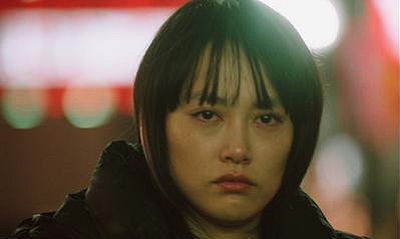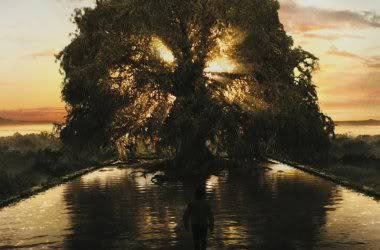Babylon 5: 'Comes the Inquisitor' and 'The Fall of Night' (2x21 &2x22)
It would be pretty hard to top the greatness of 'The Long, Twilight Struggle,' an episode that plays a lot like a season finale, wrapping up the Narn-Centauri conflict and moving on to a rebuilding phase for the story. These episodes move from payoff to rebuilding, though 'Night' does give us resolution to some major ongoing mysteries and sets things up for a very tumultuous season three.
'Comes the Inquisitor' is reminiscent of 'And the Sky Full of Stars,' both episodes recall The Prisoner and its mindwarping interrogation sequences. The main plot raises some interesting issues about the Vorlons, but ultimately doesn't tell us much we don't already know about the characters. As we find out in the next episode, the Vorlons are likely responsible for many of the supernatural sightings on Earth, be they angels or UFOs. More on that later, in the context of this episode, it seems like the excuse to do a story that JMS wanted to do. I suppose Kosh chooses this moment to test his people because he knows that the great war is about to break out, however it seems rather arbitrary.
The interrogation itself is designed to prove that Delenn and Sheridan are willing to sacrifice themselves, even if it means no glory or honor for themselves. The way things are set up however, it tells me that they're willing to sacrifice themselves for each other. I'm curious to see how their relationship plays out, the end of this episode brings them even closer together, it's one of the major open threads going into season three. If this was a Joss Whedon show, they would be about to get together when Sheridan receives a call letting him know that his wife is still alive. I know that JMS likes to torture the people in his universe, but I haven't seen a tendency to force real pain on his main characters, as Joss did so frequently.
Having recently read From Hell, the revelation that this guy is Jack the Ripper is interesting in that it's more evidence of the power of Jack as mythology, to linger long after the man is dead. Sebastian even comments, he is remembered, but not as a person, only as Jack, this culturally constructed mythological figure. Even more than the in story content, the fact that JMS chose to make a story using Jack the Ripper is evidence of the killings' lingering fascination in our society.
Elsewhere, G'Kar struggles to maintain his fragile power base. The best moment here is in the elevator with Vir. Vir has previously been used primarily as a comic character and contrasting that behavior with G'Kar's intensity is a great choice. I was guessing that he'd try to use Vir to get a communication from Narn, further developing Vir's uneasiness with the direction of Centauri policy. But, I think the direction they went was a more realistic choice. Sheridan's aid to G'Kar here is critical in setting up the events of the next episode.
In general, this episode was better shot than most. There were a lot of striking closeups used, going closer than the camera usually does on the show. We also got some very strong visual storytelling, as in the afforementioned elevator scene.
That brings us to the finale. This episode was another really strong one, though not quite matching 'Twilight' or 'The Coming of Shadows.' There are some shows, like Buffy or Six Feet Under, where the seasons are structured as individual stories and, consequently, the season finale is a massive payoff. Babylon 5 is structured more like Angel, where the stories drift across seasons, meaning the season finale is less important than it would be on other series. Certainly this is a key episode, but it's just one among six or seven critical episodes in the season.
The most interesting development here is the way the two major plotlines of the season, the rise of the Centauri/Shadow threat and the corruption of Earth's government, come together. The arrival of Lantze comes at the worst possible time, with Sheridan having pledged to guard a Narn ship. Because we've viewed the war largely from the Narn perspective, we're totally behind Sheridan when he tries to offer aid to G'Kar. I particularly like the opening scene with Garibaldi and Sheridan talking about the change in Londo, the fact that you either feel sorry for him or fear him has been exactly my reaction to his development.
Considering it was a season finale, I was expecting something a bit more jampacked with events. The first half of the episode is pretty leisurely, spending a lot of time developing NightWatch. This group has sold a number of station personnel on its mission, and that's beginning to cause problems for the station in general and Zack in particular. There's clearly a communist witchhunt allegory here, with people getting taken down just for criticizing the government. The arrest of the shop owner at the end is a particularly strong visual.
Nightwatch seems to be offering Ivanova the same kind of deal that Morden gave Londo back in 'Signs and Portents.' Welles asks her what she wants and she replies honestly, appreciating any help he might give her, presumbly in exchange for a couple of small favors down the line. I doubt she'll be as stupid as Londo was, but it'd be interesting to have her question Sheridan more next season, and possibly even make a play for command of the station. The human characters are all pretty much unanimous in their support of Sheridan's goals, more conflict between them would add another layer to the next season.
But, there's certainly going to be enough conflict to go around. I was very surprised when Lantze announced the Earth's alliance with the Centauri. I'd just been assuming that Earth would realize the Centauri's danger and eventually side with the Narn, particularly when the Shadows emerged, but having the Earth government aligned with the Centauri actually offers a lot more interesting story possibilities. It puts Sheridan in a tough position, having to work against his own government's agenda.
This is all foreshadowed nicely by G'Kar's speech in the corridor. He's lost so much of his majesty, reduced to being that crazy guy preaching on the street and even hiding behind a bush to be present at the ambassadorial negotiations. He still has a critical piece of information, the connection between Londo and the Shadows, which will likely come into play later in the season.
I'd have liked to see what Delenn thought of the proposed Earth-Centauri alliance. How will that figure in to the existing plans that she made with Kosh? It's not really touched on, but I'm assuming much of next season is spent dealing with Sheridan's split alliance. He's fighting a war on every front now, and even his own ship isn't safe, with Night Watch constantly undermining his authority. If Earth remains aligned with the Centauri, how can he continue to do the diplomatic work Babylon 5 needs to do?
At the end of the episode, Ivanova claims that the station is now the last, best hope for victory. But, what is victory? Isn't victory for Earth now victory for the Centauri? This is another clear World War II parallel, with Earth having won the victory of peace, totally oblivious to the fact that the Centauri will not stop their advances because of a treaty. They will use this treaty as shelter until they have so much power they can overwhelm Earth.
The end of the episode felt a bit rushed. I assumed the 'Great War' meant war with the Shadows, not the Narn-Centauri conflict. But, it's been pretty warrish out there, so I can't really say I was lied to. The final scene, the ISN broadcast of the Shadow video, doesn't seem immediately troubling. But, Delenn claimed that their greatest advantage was that the Shadows didn't know anyone knew about them, this means that advantage is gone.
That leaves one major thing to address from the episode, the revelation of Kosh's true nature. After so much buildup, it would have been easy to disappoint, but this revelation did not. I love the fact that everyone sees him as something different. His glowing light body was very cool, with a truly alien, yet warm feel. That moment is a nice capper to his overall arc for the season, getting more and more drawn into the goings on with the station.
As the season ends, everything is in chaos and we get pretty much no resolution. But, without a gap between the seasons, that's not a problem. Season two was a major leap forward for the show. Season one had a few good episodes, a bunch of okay ones and a bunch of weak ones. Season two had a few truly astonishing episodes, a bunch of good ones and only a few okay ones. I was completely assured that JMS knows what he's doing and that all the pieces we see will resolve themselves in interesting ways. The show went to depths I've rarely seen in fiction, and I'm guessing will go even further before the series is through. On to season three, 'The Point of No Return.'













